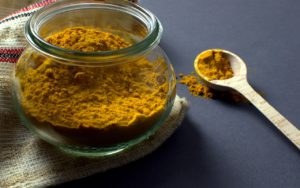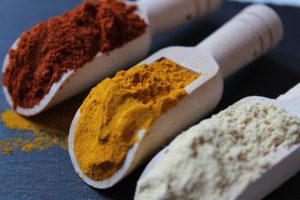What is Turmeric?
Thank you for reading this post, don't forget to subscribe!How do you pronounce it? Too-meric? Tur-meric?
Tumeric’s uses dates back nearly 4000 years to the Vedic culture in India. It was used as a culinary spices.Tumeric, also was believed to for protect against evil spirits. Currently, it is used around the world for many purposes. It is used to dye clothing, as an antiseptic for wounds, also in sunscreens and facial products. In some cultures turmeric paste is applied to the skin of the bride and groom, where it is believed to make the skin glow and keep harmful bacteria away from the body.
Tumeric has undeniable health benefits.
It’s anti-inflammatory.
Turmeric’s most active ingredient, curcumin, is the source of its anti-inflammatory effect. Curcumin, gives turmeric its vibrant, golden color. Research has proven that curcumin reduces the presence Cytokines, inflammatory proteins. In this research those participating, experienced less inflammation in their joints. Other studies suggest that Curcumin blocks inflammatory enzymes 5-LOX and COX-2. (Source)
It has antioxidant features.
Curcumin, is a potent antioxidant that can neutralize free radicals due to its chemical structure. Free radicals are linked to multiple illnesses, including diabetes, heart disease, and cancer.
It may fight cancer.
Preliminary findings show curcumin lowers levels of a particular protein that is a key sign of prostate cancer. Other studies have shown that it can increase the effectiveness of chemotherapy with advanced pancreatic or colorectal cancers.
 It may help prevent Alzheimer’s.
It may help prevent Alzheimer’s.
One of the important pathogenesis in Alzheimer’s disease, is the chronic inflammation of nerve cells. By the inhibition of Egr-1 DNA-binding activity due to curcumin’s anti-inflammatory effects, several preclinical studies have found curcumin prevented or reversed certain pathological features of Alzheimer’s disease.
It may help prevent heart disease.
Curcumin also helps combat risk factors of heart disease by suppressing chronic inflammation, reducing the impact of glucose, and normalizing blood lipid profiles. Curcumin also has the ability to improve the function of the lining of your blood vessels to regulate your blood pressure and other factors vital to heart health.
The best way to incorporate turmeric into your life is, of course, subjective. The key is to determine which method best suits your lifestyle and gives your body the health benefits you’re looking for. Since turmeric is traditionally used in Indian and South Asian cuisine, many people enjoy pairing turmeric with curries. Click here for a delicious turmeric-coconut curry recipe!





